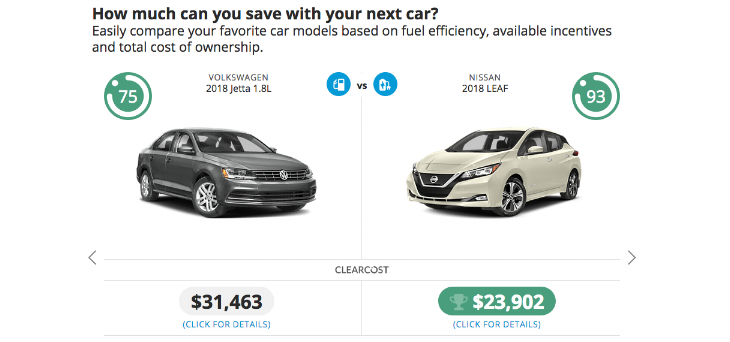
Screenshot of ConEd Cars, the New York utility's car-choice comparison tool.
This is a guest post from AEE member company Enervee.
As noted by AEE in its new issue brief, EVs 101, the evolution of transportation will depend to a large extent on the choices of consumers. This may seem self-evident, but the consumer perspective can easily get lost in the high-stakes discussions surrounding electric vehicle (EV) charging infrastructure – what’s needed where and when, who should provide it, and how to pay for it. But when it comes to cars, consumers are king – and the overwhelming majority believe that their energy provider should help them understand the benefits of EVs over conventional vehicles. That’s something regulators should capitalize on as they prepare to grow the market for EVs.
AEE’s EVs 101: A Regulatory Plan for America’s Electric Transportation Future underscores the importance of improving market transparency and developing data-driven customer engagement programs that leverage behavioral insights to stimulate consumer demand for EVs. Although consumers desire key attributes provided by EVs – in particular, saving money on fuels costs and reducing environmental impacts – the vast majority of people remain completely unaware of the existence of EVs.
The relatively brief time that electric vehicles have been available in the mass market, a shortage of automobile manufacturer marketing, unavailability of EV models in specific markets, and a lack of market transparency in terms of the relative operational efficiency and emissions of vehicles across fuel and engine types are some of the reasons cited by AEE for lack of consumer awareness. Conversely, when consumers are armed with a simple and credible way to choose vehicle models that are zero-emission, inexpensive to operate, and do not cost more to purchase, 84% say they would be likely (45% extremely likely) to opt for an electric over a conventional car model.
The Enervee team has tackled these challenges head on, by introducing the Enervee Score for Cars and embedding it in a powerful cloud-based vehicle choice engine available to consumers via their utilities. Spanning internal combustion engine (ICE), hybrid and plug-in electric vehicles, the zero-to-100 Enervee Score allows consumers to readily compare individual models on their relative efficiency – without having to think too hard about it.
Whereas the MPG label shows how many miles a particular car can travel on one gallon of fuel, regardless of horsepower, the Enervee Score for Cars makes the relative efficiency among models of similar performance visible and actionable for consumers. Someone shopping for an SUV is unlikely to be swayed to buy a compact sedan, just because it has higher MPG, but research suggests that they can be swayed to buy an SUV that has a higher Enervee Score, because it's more economical to operate and eco-friendly, things car buyers care about.
Several of Enervee’s partner utilities are already leading the way to respond to this clear call to action from consumers with their Cars choice engine deployments. Southern California Edison Cars, for example, highlights available Federal and State incentives, and offers an extra $1,000 rebate for vehicle registration of an EV. Funding comes from California’s Low Carbon Fuel Standard (LCFS) program, which encourages customers to reduce transportation-related greenhouse gas (GHG) emissions by encouraging them to adopt cleaner fuels, like electricity.
Quoting Enervee’s in-house research, AEE emphasizes how important it is for regulators to leverage the existing relationships that utilities have with their customers to help them navigate the unfamiliar and complex considerations surrounding an EV purchase, including home EV charger equipment, EV tariffs, and rooftop solar to charge green. Con Edison was the first to rise to the challenge, offering ConEd Cars, which cross-promotes the utility’s SmartCharge New York program, and is complemented by its home EV charger choice engine and solar concierge service.
Insights from these pioneering deployments can inform regulators grappling with the role of utilities in driving EV adoption and supporting a self-sustaining market for clean vehicles without incentives.
AEE’s Regulatory Plan also weighs in on six other recommendations, including the need for utility planning and operations to fully integrate electric vehicles, the roles of various stakeholders in electric vehicle charging infrastructure ownership & financing, rate designs, and ensuring that vulnerable populations aren’t left behind. These are all critical issues that need to be addressed for a successful transition to electrified transportation. But let's not forget the consumer!
